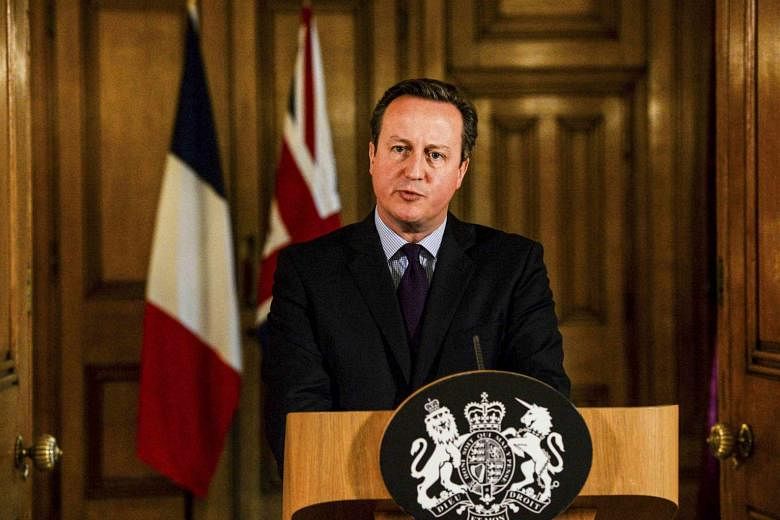British Prime Minister David Cameron has had to grapple with domestic opposition to military involvement in the Syrian civil conflict since war started in that Middle Eastern country four years ago.
Mr Cameron became the first British leader in almost a century to lose a vote on a war question, when Parliament rejected his arguments for the use of air power against Syrian government forces in August 2013.
Much of this opposition stemmed from memories of Britain's involvement in the US-led invasion of Iraq a decade previously, a war now widely regarded by the electorate as a grave strategic mistake and a tragic waste of human lives. As Mr Ed Miliband, then leader of the opposition Labour Party, put it: "Britons want to learn the lessons of Iraq; they want things done in the right way."
Yet finding the "right way" to persuade a sceptical public has not been easy for Mr Cameron. He has had to fend off criticism that the use of air power to overthrow Libyan leader Muammar Gaddafi in 2011 - a decision for which he was personally responsible - produced no long-lasting beneficial outcomes: Libya is now mired in war, just as vicious as the one prevailing in Syria.
Mr Cameron's critics also challenged him to prove how he can ensure that air strikes will not kill civilians or generate "collateral damage". "Air strikes in populated areas caused 3,165 civilian deaths and injuries in the year up to August," claims Action on Armed Violence. The non-governmental organisation did not explain how it arrived at such a precise figure, but the belief that air strikes are imprecise is widespread.
Nor was the British leader able to explain how air strikes can distinguish between the "good" and "bad" guys on the ground, between people who should be supported and those who must be opposed. A bewildering collection of up to 100 different paramilitary formations now operate in Syria. Discriminating between them is a fool's errand, claim the critics.
An influential British parliamentary committee of inquiry released a critical report earlier this month, arguing that "no decision" on the use of force in Syria should be taken until the government presents a "coherent international strategy" to defeat the Islamic State in Iraq and Syria (ISIS) terrorist organisation and end the country's civil war.
Critics also point out that Britain currently has only eight aircraft operating in Iraq on similar missions against ISIS. That's hardly a big contingent, and it's unlikely that London would be able to do more than just double that number of jets, should a future operation against Syria be authorised.
And then, there are lingering questions about what an air campaign would achieve. Air power has influenced the conduct of previous wars, but has never settled any conflict. If Britain wants to help stop the war in Syria, there is no escape from sending troops on the ground, and from putting its soldiers in harm's way.
But since Mr Cameron has ruled this out, a political solution is the only alternative, argue opponents. "In our view, the dreadful Paris attacks make the case for a far more urgent international effort to reach a negotiated settlement of the Syrian civil war," argues Mr Jeremy Corbyn, the current opposition Labour leader, who plans to commit his party to vote against air strikes.


